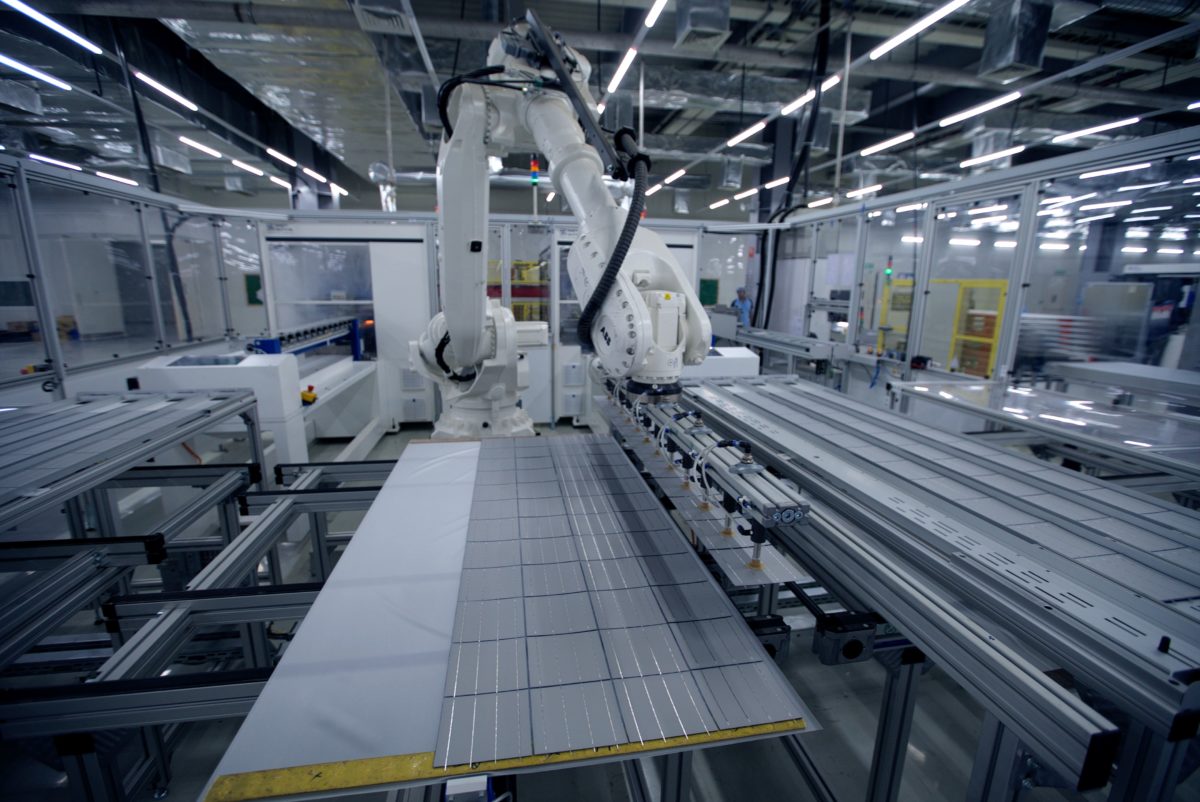The Indian solar manufacturing sector must strive for building a sustainable, vertically integrated ecosystem, rather than focusing solely on output, says a new report by JMK Research and the Institute for Energy Economics and Financial Analysis (IEEFA).
India, which targets 300GW of installed solar power generation capacity by 2030, has a PV cell manufacturing capacity of 4.3GW and a module manufacturing capacity of 18GW. The actual output is even lower as most of these manufacturing facilities have been operating below their nameplate capacities at a capacity utilization factor (CUF) of 40-50% or less.
The nation has been a laggard in manufacturing not just upstream PV components such as wafers and cells but also modules.
In comparison, China accounts for about 61% of the global solar module manufacturing capacity of 358 GW. India’s manufacturing capacity of 18GW is roughly equal to the annual capacity addition of the top individual Chinese PV brands, a comparison that shows the vast scope for Indian companies to match their economies of scale, states the report.
For raw materials, Indian manufacturers rely on imports mainly from China and face associated risks of shortages and price hikes. This highlights the need for a sustainable, vertically integrated domestic solar manufacturing ecosystem.
“Without large-scale domestic manufacturing, from raw materials through to modules, the overarching risks of logistics and commodity price fluctuations for imports will persist,” says co-author Vibhuti Garg, Energy Economist and Lead India, IEEFA.
Policy push
The report notes that the ambitious PV installation target, coupled with government support, has made the prospects for indigenous photovoltaic (PV) manufacturing increasingly vibrant. Dozens of companies are vying to make a mark in the Indian solar sector.
The Government of India’s Production-Linked Incentive (PLI) scheme for integrated PV manufacturing with an initial outlay of INR 4,500 crore (US$616 million), plus the additional allocation of Rs19,500 crore (US$2.5 billion) in Budget 2022, would have the combined potential to produce at least 40GW of solar modules.
Co-author Jyoti Gulia, Founder, JMK Research, says: “The PLI scheme alone, if judiciously implemented, can increase the integrated solar module, cell and wafer domestic manufacturing capacity several times over in the next three to four years.
“This will help in creating a huge demand potential for the PV ancillary market – solar glass, ethylene-vinyl acetate (EVA), etc – and skilled workforce. The direct investment in the country on account of PLI budget expansion would potentially rise to about Rs90,000 crore (US$11.5 billion).”
Way forward
Among issues before the Indian industry are the relatively low capacity utilization in factories producing solar cells and the type of solar cells being produced. The majority of domestic production (60-70%) employs multi-Si module technology – which is nearing obsolescence.
New major manufacturers who are planning to expand or enter the market aim to install machinery to produce mono-Si modules, the prevailing technology. This development will aid domestic players in competing with global rivals on quality and price.
The Indian PV industry also faces mid- to long-term challenges of high manufacturing expenses, inadequate research and development (R&D), and a shortage of skilled manpower.
Garg says, “Developing significant manufacturing capacities in raw materials, especially polysilicon, will be highly capital intensive and technologically complex. Domestic manufacturing companies need to have a proactive technology partnership with innovators or research institutes.
“Rather than focusing solely on output, it’s imperative for the domestic solar manufacturing industry to create a strong foundation for sustainable development overall.”
This content is protected by copyright and may not be reused. If you want to cooperate with us and would like to reuse some of our content, please contact: editors@pv-magazine.com.









3 comments
By submitting this form you agree to pv magazine using your data for the purposes of publishing your comment.
Your personal data will only be disclosed or otherwise transmitted to third parties for the purposes of spam filtering or if this is necessary for technical maintenance of the website. Any other transfer to third parties will not take place unless this is justified on the basis of applicable data protection regulations or if pv magazine is legally obliged to do so.
You may revoke this consent at any time with effect for the future, in which case your personal data will be deleted immediately. Otherwise, your data will be deleted if pv magazine has processed your request or the purpose of data storage is fulfilled.
Further information on data privacy can be found in our Data Protection Policy.